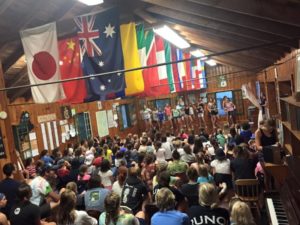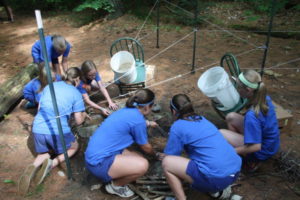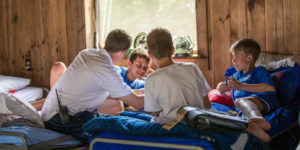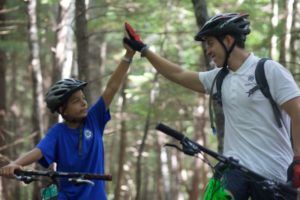Problem-Solving at Camp: A Skill for a Lifetime

Skill Development at Camp
Camp offers a broad range of benefits to kids, from participating in outdoor activities, to being in nature, to making new friends. In providing these opportunities, camp also presents an environment for developing a wide variety of skills. While swimming or sailing, creating art or music, pitching a tent or navigating a challenge course, kids learn to problem-solve. Camps of all kinds provide a unique setting for learning it.
Camp Promotes Collaboration
At residential camps, problem-solving takes all forms, both in carrying out camp activities, and in the reality of campers’ living together. Catriona Sangster, director of girls’ Camp Wawenock, in Raymond, calls problem-solving “one of the beauties of camp.”
“At camp, when you’re living in close quarters with a group of people, you have to face whatever comes up,” she says. “It’s a great skill kids pick up.”
Sangster says the camp setting is ideal for problem-solving because it differs from kids’ typical environments, which are often “fairly regulated” by adults, either at school, or in after-school activities. At Camp Wawenock, for example, campers work together to come up with guidelines for living together in their cabins. And if conflict arises, campers, with guidance from counselors, “have face-to-face conversations that help them work through how to live together in a productive way.”

Problem-solving skills also come into play through collaboration, Sangster says. For example, girls at every age level in camp put on a unit program for the entire camp. Depending on the age level, staff provides varying amounts of support, but for all the campers, this project allows girls “to take ownership of the project.”
“They are building that skill set for successfully navigating those waters,” Sangster says.
Campers must also problem-solve during activities, she says. For example, some camps have ropes courses that demand participant collaboration. Similarly, campers may need to join forces in figuring out how to keep out the rain on a camping trip, Sangster says.
The most important aspect of learning to problem-solve is the act of listening, Sangster says. “We talk to staff about it. It’s not about us problem-solving for kids, it’s listening to hear how to help kids problem-solve themselves.”
“As adults, we tend to talk too much,” she says. At camp, the focus is on listening and hearing. “What happened, how did it make you feel, what could you do differently next time?”
Communication at Camp is Key
Dave Suitor, director of Camp Timanous, a boys’ camp in Raymond, says campers’ physical setting provides the “raw materials” for teaching campers to problem-solve.
Campers are housed about a dozen to a cabin, along with three or four counselors, Suitor says. “It provides the raw materials for negotiation and compatibility,” he says. “If you don’t get along, you can’t run away to your room.” Suitor says the high staff-to-camper ratio also helps when problems arise, because there is always a counselor present to help kids work out solutions.
Living together also promotes a sense of “cabin unity,” where campers collaborate to keep their space tidy, Suitor says. Campers join forces to prepare for a daily cabin inspection, which “promotes a lot of pride in their cabin unit.” In addition, cabin activities – even as simple as nightly story-telling – can promote congeniality, he says.
Suitor says that lots of “one-to-one communication” between counselors and campers helps promote problem-solving skills, as does the camp’s mentoring system where older campers guide younger ones.

At Kamp Kohut, a coed camp in Oxford, director Lisa Tripler says that at all levels of camp life, campers are challenged to collaborate and work together successfully. The skills campers learn are “skills for life,” she says, whether that’s on the archery range, the adventure course, or in cabin life.
“It’s woven into everything we do,” she says. And while the word “problem” may have negative connotations, campers are “maneuvering and negotiating” throughout their camp day, she says.
Staff are key, she says. They are trained to teach and help, but “not doing it for them.”
“Adults are very kindly guiding in the background,” she says. “They are very much hands-on, but not solving it for them.”
Tripler says there are “two prongs” to problem solving. For example, in archery, a camper may ask, “how am I going to do a better job, and how am I going to take turns nicely with my neighbor on the range?”
Problem-solving skill development is not unique to residential camps, however. Eli Small, director of Center Day Camp in Windham, says campers learn to solve problems in a variety of settings at camp. Even simple transitions at camp, like changing in the bathhouse for swimming, teach kids how to work out issues such as keeping track of their belongings and organizing their locker.

As a weekly day camp, kids at Center Day Camp also face social interactions that demand problem-solving skills. Campers who attend camp every week need to learn how to welcome new campers, for example. Then there are the issues that arise in activities, like sharing playground equipment, or deciding who gets a turn paddling the canoe, Small says.
Like many camps, Center Day Camp also promotes intentional problem-solving through different activities, Small says. Whether the activity is nature, art, drama, or athletics, campers may be presented with challenges requiring collaboration to solve.
For example, sailing “is one giant problem-solving exercise,” in terms of adjusting to the wind and balancing the boat, he says. Similarly, canoeing demands such skills in determining the best route for reaching a destination.
Even building fairy houses in the woods requires that campers figure out how to best arrange sticks and rocks so their creation is stable, Small says.
Small says staff are trained to teach problem-solving skills, much of which is done through role-playing. Senior staff may act out scenarios, while newer staff offer feedback. The same system is used when dealing with campers, Small says. “We ask campers, ‘how do we solve the conflict?’”
Learning at camp takes all forms. Activities teach kids new skills, and so do social interactions. Whether campers are navigating the nuances of sharing living space, or collaborating on a joint project, they are developing abilities that are in no way limited to a session at camp. Camp directors agree: learning to solve problems is a skill that may be fostered at camp, but it may well be instilled for a lifetime.